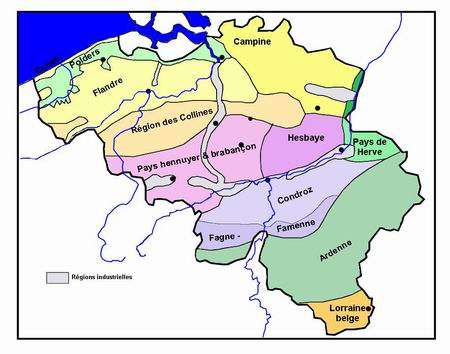Condrusi

The Condrusi were a Germanic tribe of ancient Belgium, which takes its name from the political and ethnic group known to the Romans as the Belgae.[1] The Condrusi were probably located in the region now known as Condroz, named after them, between Liège and Namur. The terrain is wooded hills on the northeastern edge of the Ardennes.
The Belgae were distinguished from the Celts and apparently claimed to be of Germanic descent. From Belgic names we know that the Belgae were heavily influenced by the Gaulish language, but from other information we know that they were also heavily influenced by Germanic peoples on the east of the Rhine river. In particular, the Condrusi were in the tribal group known as the Germani cisrhenani, who are amongst the Belgae most strongly associated with Germanic ancestry.
We learn all we know about the Condrusi from Julius Caesar in Commentarii de Bello Gallico. In 2.4, Caesar states that the Belgian Germani had crossed the Rhine long ago to take control of the fertile land on the other side. They kept a distinct identity, and a reputation for military strength, because they were the only Gauls who successfully resisted the Cimbri and Teutones during their migrations in the second century BCE.[1]
Whether the Germani cisrhenani in Belgium actually spoke a Germanic language, is uncertain, but in any case it was claimed by Tacitus that these Germani were the original Germani, and that the term Germani as it came to be widely used was not the original meaning. He also said that the descendants of the original Germani in his time were the Tungri.[2]
In chapter 2.4 of Caesar's commentaries the Condrusi are specifically listed amongst the Germani, along with the Eburones, the Caeroesi, and the Paemani. At that time, in 57 BCE, they were joining an alliance of Belgic tribes against Caesar.[1] The alliance met with defeat at the Battle of the Sabis, but some, including many of the Germani, most notably the Eburones, renewed fighting in 54 BCE.
In 4.6 Caesar reports that the Condrusi were (along with the Eburones) under the protection of the Treveri along with the Eburones. How this circumstance came about is not known, but their territories were thereby not invaded by the Usipetes and Tencteri who had lost their own lands to Suebi and then crossed the Rhine into the lands of the Menapii.[3]
In 6.32 the Condrusi are again mentioned as Germani "on this side of the Rhine" (citra Rhenum), this time along with the Segni (or Segui), as a German tribe claiming not to be involved in the rebellion. Both tribes were reported to live between the Eburones and the Treviri.[4]
After their defeat or capitulation, the Germani cisrhenani became part of the civitas Tungrorum in Roman province of Gallia Belgica. But this civitas was eventually split out to become part of Germania Inferior. An inscription in Scotland shows that soldiers from the pagus Condrustis served within the second cohort of the Tungrian civitas, and worshipped a goddess named Viradecthis.
The name of the pagus Condrustis survived not only into Roman times but into the Carolingian era also, being mentioned as a county in the early Middle Ages. In this way, the name, like many medieval county names, has managed to survive down to the present day, at least as a geographical term.
See also
References
- 1 2 3 Julius Caesar, Commentarii de Bello Gallico 2.4
- ↑ Tacitus, Germania, II 2. ceterum Germaniae vocabulum recens et nuper additum, quoniamqui primi Rhenum transgressi Gallos expulerint ac nunc Tungri, tunc Germani vocati sint: ita nationis nomen, nongentis, evaluisse paulatim, ut omnes primum a victore obmetum, mox et a se ipsis invento nomine Germani vocarentur.
- ↑ 4.6
- ↑ 6.32